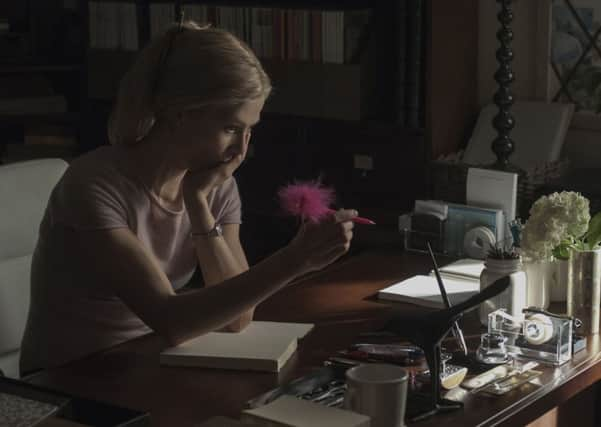Film reviews: Gone Girl | The Equalizer


Gone Girl (18)
Director: David Fincher
Running time: 145 minutes
Star rating: ****
See it before the breakup, and it might soften the blow. See it afterwards, and they might even thank you for doing the deed.
Nick (Ben Affleck) and Amy (Rosamund Pike) are initially a dream couple: living in New York, doing dream jobs and living in great apartments. They meat at a party and enjoy a first kiss that is literally sugar-coated. The wedding proposal is applauded by admiring onlookers, yet by their fifth wedding anniversary they are out of their jobs, out in the sticks and on the outs with each other. Amy broods at home alone, while Nick runs a bar with his devoted twin sister Margot (Carrie Coon), who detests Amy. From marital bliss to martial bitterness: how did it come to this?
Advertisement
Hide AdAdapted by Gillian Flynn from her 2012 bestseller, the film flits between the present and a past recounted from Amy’s point of view, and its plotting grows increasingly twisted and wild. The bone of contention is disappointed expectations: Nick is supposed to be a source of masculine strength, Amy the luminous, supportive wife, but the wheels finally come off altogether when Nick comes home on their fifth anniversary to find a broken glass table, traces of blood, and his wife missing. The police are called and the media are immediately alerted. Not only is Amy beautiful and vanished, she has a degree of fame as the model for her parents’ lucrative Amazing Amy books, about the accomplishments of a bright young overachiever made in Amy’s image.
Nick becomes the chief suspect, scrutinised by family, police and the media. A TV host (Missi Pyle) offers a ball-by-ball assessment of the investigation and of Nick’s conduct. As an abandoned husband he seems too calm, too collected, and he’s given to smiling reflexively at the worst possible moments. Amy has also left a journal which diarises their relationship. Nick doesn’t come out of it too well.
What’s great about Gone Girl is that it both embraces and confounds expectations of a vanishing spouse drama. It also has a supporting cast of intriguing characters. A likeable, powerful, Johnnie Cochran-style lawyer (Tyler Perry) is brought in to help Nick reshape his image in the media wars. A trailer trash gum-chewer (Lola Kirke) turns out to be a shrewd judge of character. And Neil Patrick Harris gives everyone the creeps as one of Amy’s most obsessive ex-boyfriends.
Affleck gives his most honest performance as the insincere Nick, but the game-changer is Pike, a gifted British actress who finally gets to play something more complex than an ethereal beauty, and showcases a gift for bitter comedy only hinted at in previous roles. As the film pings our assumptions about who has been wronged, and says some smart things about the power games that play out in relationships, you both want to hug Gone Girl for refusing to play dumb and hide from some of its unvarnished truths. It’s the kind of film we hoped David Fincher might make with Dragon Tattoo; a satisfying, ironic, and sophisticated thriller. Go see.
Twitter @SiobhanSynnot
• On general release
The Equalizer (15)
Star rating: ***
If you cherished Edward Woodward’s 1980s TV show where a retired government agent dispensed social justice, be warned: this is not your Equalizer. Begone images of a baggy, bespectacled man in a trenchcoat. Instead, we have Denzel Washington (right) channelling Liam Neeson in Taken.
Robert McCall lives a fastidiously austere life, working at HomeMart, a benevolent DIY store. Director Antoine Fuqua makes heavy weather of establishing how universally liked McCall is, whether joshing with young wiseguys, helping a co-worker lose weight, or dispensing motivational advice like “body, mind and spirit”, “got to be who we are in this world,” and other aphorisms you may recognise from shaving commercials.
Advertisement
Hide AdAt night he repairs to a local diner that duplicates Hopper’s Nighthawks painting, to read symbolic books like Don Quixote or The Invisible Man, and befriends a cute Russian hooker (Chloë Grace Moretz). When she is hospitalised after a brutal beating, McCall finally uncloaks and hunts down the evildoers.
Even in a city the size of Boston, this is not an arduous job since all villains are lavishly tattooed with demons and skulls. Still, in the interests of fair play, Washington always gives bad guys a chance to make amends. If they don’t, a horrible death awaits; some astonishingly elaborate, when really a quick bullet could save a lot of faff.
Ferociously overdirected, The Equalizer is held together by Washington’s charisma, but it’s still a clunker with no sense of balance.
• On general release